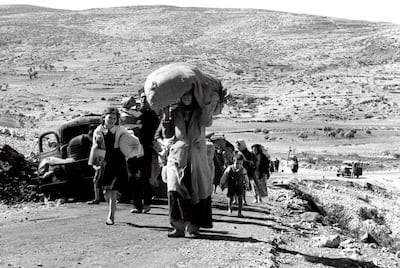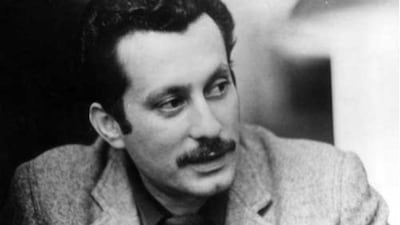Fifty years ago in July, Mossad assassinated Ghassan Kanafani. They planted a bomb in his car killing him and his 17-year-old niece, Lamis. Over the years I’ve thought much about Ghassan, his contributions to Arab literature, our meetings, and the role he played in shaping my doctoral dissertation and my thinking about Palestine.
During the summer of 1971, I was in Beirut on a grant from my university. I had come to Lebanon to conduct dissertation research on the emergence of Palestinian national identity. Ghassan was one of my first meetings. Having been captivated by his writings, I was excited to meet him. I’ll never forget his dedication to “Um Saad”, the first of his works I read – “To my father and mother, the wings that flew me over the rocks of oblivion.”
Our first encounter almost didn’t go well. He was sitting at his desk having a heated phone conversation. As I waited for him to finish, I looked at the wall behind him – a collage of newspaper clippings, photos and posters.
He finished his call and looked up at me rather dismissively suggesting that I was, as he put it, “another American of Arab descent who had come to Lebanon to find himself in the Palestinian cause". He turned to the wall behind him and pointed at a picture of a mass mobilisation to end the war in Vietnam, arrogantly noting that if I wanted to find myself, I should go back to America and join that effort and the struggle for civil rights.
Instead of just leaving, I responded curtly telling him that I knew who I was, I was active in both the anti-war and civil rights movements, and I was in Lebanon not to find myself but to conduct research for my dissertation. I told him that I needed help making contact with Palestinians in the camps and he could either help me or not.
What would have happened if the world heeded their call for justice for Palestine
My directness apparently worked, and we got down to business. He and others with whom I met provided me with contacts who would take me to the camps so I could interview Palestinians who had been forced to flee in 1948. I spent time in Ein Al Hilweh meeting dozens of refugees, taking notes from their stories, seeing pictures of the homes they left behind, all the time querying about what being Palestinian meant to them.
When I returned to Beirut, I had a few more meetings with Ghassan. He listened to what I had heard and had questions of his own about my thesis, asking: “What exactly are you trying to find?” I told him about the notion of “revitalisation movements” developed by one of my advisers – which described how groups of peoples traumatised by social, political or economic dislocation often undergo a transformation of thought. Anthony FC Wallace, the Canadian-American anthropologist who had done his work studying revolutionary movements developed among Native Americans, called this transformation a “maze-way re-synthesis", in which old patterns of thought and identity were replaced by a new sense of communal understanding. Some of these movements look backward to an idealised past; others, while drawing on past experiences, project a forward-looking transformational future.
After listening, Ghassan said: “In the camps you experienced the first kind.” Out of their devastating loss, he said: “The refugees have romanticised the past and want to recreate it." This resonated with what I had found – the way the camps had been structured around their villages and village life or their stories of a dream-like pastoral bliss.
Ghassan then suggested: “If you want to understand forward-looking revolutionary thought, you need to go to the Palestinian citizens of Israel. In their poetry and politics, you will find the Palestinian future. It is their vision that will lead us.” He gave me books of poetry by Tawfiq Zayyed, Mahmoud Darwish, Sameh Al Qasim and others. He also gave me a long interview (which I later published) laying out “The Role of Poetry in the Palestinian Struggle".
I returned to the US, began writing my dissertation, and periodically wrote to Ghassan. Months later, the world was shocked by a horrific terrorist attack committed by members of the Japanese Red Army. Twenty-nine innocent tourists were massacred at Israel’s Lod Airport. When I saw that the magazine Ghassan edited carried the story on its front page, heralding the terror attack as a heroic revolutionary action, I was sickened and wrote an angry note to Ghassan denouncing the massacre as a senseless, disgusting murder and condemning the magazine’s support for it.
I don’t know if he ever saw my letter, because shortly thereafter he was assassinated. This, too, was a horrific terrorist attack – although it was never seen as such by the West’s double standards.
I can’t forget Ghassan and our brief and conflicted relationship. I was fortunate to have met him and to have had my thinking partly shaped by his remarkable intellect. He was a literary giant and proved to be generous in sharing his ideas. The impact he and his generation of Palestinians had is profound. I lament that loss today.
What would have happened if the world heeded their call for justice for Palestine? What could have happened if the persistent traumas that have shaped Palestinian existence didn’t occur? Could recent history not have been altered if all parties did not apply a conflicted sense of morality to the violence of the resistance and the violence of the Nakba, and the ensuing horrors of the occupation? While we will never know, I wish we still had Ghassan with us to have this conversation.
The Sand Castle
Director: Matty Brown
Stars: Nadine Labaki, Ziad Bakri, Zain Al Rafeea, Riman Al Rafeea
Rating: 2.5/5
Mohammed bin Zayed Majlis
UAE currency: the story behind the money in your pockets
Key figures in the life of the fort
Sheikh Dhiyab bin Isa (ruled 1761-1793) Built Qasr Al Hosn as a watchtower to guard over the only freshwater well on Abu Dhabi island.
Sheikh Shakhbut bin Dhiyab (ruled 1793-1816) Expanded the tower into a small fort and transferred his ruling place of residence from Liwa Oasis to the fort on the island.
Sheikh Tahnoon bin Shakhbut (ruled 1818-1833) Expanded Qasr Al Hosn further as Abu Dhabi grew from a small village of palm huts to a town of more than 5,000 inhabitants.
Sheikh Khalifa bin Shakhbut (ruled 1833-1845) Repaired and fortified the fort.
Sheikh Saeed bin Tahnoon (ruled 1845-1855) Turned Qasr Al Hosn into a strong two-storied structure.
Sheikh Zayed bin Khalifa (ruled 1855-1909) Expanded Qasr Al Hosn further to reflect the emirate's increasing prominence.
Sheikh Shakhbut bin Sultan (ruled 1928-1966) Renovated and enlarged Qasr Al Hosn, adding a decorative arch and two new villas.
Sheikh Zayed bin Sultan (ruled 1966-2004) Moved the royal residence to Al Manhal palace and kept his diwan at Qasr Al Hosn.
Sources: Jayanti Maitra, www.adach.ae
Killing of Qassem Suleimani
UAE currency: the story behind the money in your pockets
The five pillars of Islam
Sholto Byrnes on Myanmar politics
The burning issue
The internal combustion engine is facing a watershed moment – major manufacturer Volvo is to stop producing petroleum-powered vehicles by 2021 and countries in Europe, including the UK, have vowed to ban their sale before 2040. The National takes a look at the story of one of the most successful technologies of the last 100 years and how it has impacted life in the UAE.
Read part four: an affection for classic cars lives on
Read part three: the age of the electric vehicle begins
Read part one: how cars came to the UAE
COMPANY PROFILE
Name: Kumulus Water
Started: 2021
Founders: Iheb Triki and Mohamed Ali Abid
Based: Tunisia
Sector: Water technology
Number of staff: 22
Investment raised: $4 million
The five pillars of Islam
COMPANY%20PROFILE
%3Cp%3E%3Cstrong%3ECompany%20name%3A%3C%2Fstrong%3E%20Klipit%3C%2Fp%3E%0A%3Cp%3E%3Cstrong%3EStarted%3A%3C%2Fstrong%3E%202022%3C%2Fp%3E%0A%3Cp%3E%3Cstrong%3EFounders%3A%3C%2Fstrong%3E%20Venkat%20Reddy%2C%20Mohammed%20Al%20Bulooki%2C%20Bilal%20Merchant%2C%20Asif%20Ahmed%2C%20Ovais%20Merchant%3C%2Fp%3E%0A%3Cp%3E%3Cstrong%3EBased%3A%3C%2Fstrong%3E%20Dubai%2C%20UAE%3C%2Fp%3E%0A%3Cp%3E%3Cstrong%3EIndustry%3A%3C%2Fstrong%3E%20Digital%20receipts%2C%20finance%2C%20blockchain%3C%2Fp%3E%0A%3Cp%3E%3Cstrong%3EFunding%3A%3C%2Fstrong%3E%20%244%20million%3C%2Fp%3E%0A%3Cp%3E%3Cstrong%3EInvestors%3A%3C%2Fstrong%3E%20Privately%2Fself-funded%3C%2Fp%3E%0A
COMPANY%20PROFILE
%3Cp%3E%3Cstrong%3EName%3A%20%3C%2Fstrong%3EEjari%3Cbr%3E%3Cstrong%3EBased%3A%20%3C%2Fstrong%3ERiyadh%2C%20Saudi%20Arabia%3Cbr%3E%3Cstrong%3EFounders%3A%20%3C%2Fstrong%3EYazeed%20Al%20Shamsi%2C%20Fahad%20Albedah%2C%20Mohammed%20Alkhelewy%20and%20Khalid%20Almunif%3Cbr%3E%3Cstrong%3ESector%3A%20%3C%2Fstrong%3EPropTech%3Cbr%3E%3Cstrong%3ETotal%20funding%3A%20%3C%2Fstrong%3E%241%20million%3Cbr%3E%3Cstrong%3EInvestors%3A%20%3C%2Fstrong%3ESanabil%20500%20Mena%2C%20Hambro%20Perks'%20Oryx%20Fund%20and%20angel%20investors%3Cbr%3E%3Cstrong%3ENumber%20of%20employees%3A%20%3C%2Fstrong%3E8%3C%2Fp%3E%0A
More from Neighbourhood Watch:
Best Academy: Ajax and Benfica
Best Agent: Jorge Mendes
Best Club : Liverpool
Best Coach: Jurgen Klopp (Liverpool)
Best Goalkeeper: Alisson Becker
Best Men’s Player: Cristiano Ronaldo
Best Partnership of the Year Award by SportBusiness: Manchester City and SAP
Best Referee: Stephanie Frappart
Best Revelation Player: Joao Felix (Atletico Madrid and Portugal)
Best Sporting Director: Andrea Berta (Atletico Madrid)
Best Women's Player: Lucy Bronze
Best Young Arab Player: Achraf Hakimi
Kooora – Best Arab Club: Al Hilal (Saudi Arabia)
Kooora – Best Arab Player: Abderrazak Hamdallah (Al-Nassr FC, Saudi Arabia)
Player Career Award: Miralem Pjanic and Ryan Giggs
Company Profile
Name: Thndr
Started: 2019
Co-founders: Ahmad Hammouda and Seif Amr
Sector: FinTech
Headquarters: Egypt
UAE base: Hub71, Abu Dhabi
Current number of staff: More than 150
Funds raised: $22 million
Company%20profile
%3Cp%3EName%3A%20Tabby%3Cbr%3EFounded%3A%20August%202019%3B%20platform%20went%20live%20in%20February%202020%3Cbr%3EFounder%2FCEO%3A%20Hosam%20Arab%2C%20co-founder%3A%20Daniil%20Barkalov%3Cbr%3EBased%3A%20Dubai%2C%20UAE%3Cbr%3ESector%3A%20Payments%3Cbr%3ESize%3A%2040-50%20employees%3Cbr%3EStage%3A%20Series%20A%3Cbr%3EInvestors%3A%20Arbor%20Ventures%2C%20Mubadala%20Capital%2C%20Wamda%20Capital%2C%20STV%2C%20Raed%20Ventures%2C%20Global%20Founders%20Capital%2C%20JIMCO%2C%20Global%20Ventures%2C%20Venture%20Souq%2C%20Outliers%20VC%2C%20MSA%20Capital%2C%20HOF%20and%20AB%20Accelerator.%3Cbr%3E%3C%2Fp%3E%0A
MATCH INFO
Who: France v Italy
When: Friday, 11pm (UAE)
TV: BeIN Sports
Zayed Sustainability Prize
More coverage from the Future Forum
UAE currency: the story behind the money in your pockets
A list of the animal rescue organisations in the UAE
Bio
Born in Dubai in 1994
Her father is a retired Emirati police officer and her mother is originally from Kuwait
She Graduated from the American University of Sharjah in 2015 and is currently working on her Masters in Communication from the University of Sharjah.
Her favourite film is Pacific Rim, directed by Guillermo del Toro
Gothia Cup 2025
4,872 matches
1,942 teams
116 pitches
76 nations
26 UAE teams
15 Lebanese teams
2 Kuwaiti teams
Key facilities
- Olympic-size swimming pool with a split bulkhead for multi-use configurations, including water polo and 50m/25m training lanes
- Premier League-standard football pitch
- 400m Olympic running track
- NBA-spec basketball court with auditorium
- 600-seat auditorium
- Spaces for historical and cultural exploration
- An elevated football field that doubles as a helipad
- Specialist robotics and science laboratories
- AR and VR-enabled learning centres
- Disruption Lab and Research Centre for developing entrepreneurial skills
U19 WORLD CUP, WEST INDIES
UAE group fixtures (all in St Kitts)
- Saturday 15 January: UAE beat Canada by 49 runs
- Thursday 20 January: v England
- Saturday 22 January: v Bangladesh
UAE squad:
Alishan Sharafu (captain), Shival Bawa, Jash Giyanani, Sailles
Jaishankar, Nilansh Keswani, Aayan Khan, Punya Mehra, Ali Naseer, Ronak Panoly,
Dhruv Parashar, Vinayak Raghavan, Soorya Sathish, Aryansh Sharma, Adithya
Shetty, Kai Smith
GOODBYE%20JULIA
%3Cp%3E%3Cstrong%3EDirector%3A%20%3C%2Fstrong%3EMohamed%20Kordofani%3C%2Fp%3E%0A%3Cp%3E%3Cstrong%3EStarring%3A%20%3C%2Fstrong%3ESiran%20Riak%2C%20Eiman%20Yousif%2C%20Nazar%20Goma%3C%2Fp%3E%0A%3Cp%3E%3Cstrong%3ERating%3A%3C%2Fstrong%3E%205%2F5%3C%2Fp%3E%0A
Read more about the coronavirus
TICKETS
Tickets start at Dh100 for adults, while children can enter free on the opening day. For more information, visit www.mubadalawtc.com.
MATCH INFO
Chelsea 0
Liverpool 2 (Mane 50', 54')
Red card: Andreas Christensen (Chelsea)
Man of the match: Sadio Mane (Liverpool)
Mohammed bin Zayed Majlis
How%20I%20connect%20with%20my%20kids%20when%20working%20or%20travelling
%3Cp%3E%0D%3Cstrong%3ELittle%20notes%3A%20%3C%2Fstrong%3EMy%20girls%20often%20find%20a%20letter%20from%20me%2C%20with%20a%20joke%2C%20task%20or%20some%20instructions%20for%20the%20afternoon%2C%20and%20saying%20what%20I%E2%80%99m%20excited%20for%20when%20I%20get%20home.%0D%3Cbr%3E%3Cstrong%3EPhone%20call%20check-in%3A%20%3C%2Fstrong%3EMy%20kids%20know%20that%20at%203.30pm%20I%E2%80%99ll%20be%20free%20for%20a%20quick%20chat.%0D%3Cbr%3E%3Cstrong%3EHighs%20and%20lows%3A%20%3C%2Fstrong%3EInstead%20of%20a%20%E2%80%9Chow%20was%20your%20day%3F%E2%80%9D%2C%20at%20dinner%20or%20at%20bathtime%20we%20share%20three%20highlights%3B%20one%20thing%20that%20didn%E2%80%99t%20go%20so%20well%3B%20and%20something%20we%E2%80%99re%20looking%20forward%20to.%0D%3Cbr%3E%3Cstrong%3EI%20start%2C%20you%20next%3A%20%3C%2Fstrong%3EIn%20the%20morning%2C%20I%20often%20start%20a%20little%20Lego%20project%20or%20drawing%2C%20and%20ask%20them%20to%20work%20on%20it%20while%20I%E2%80%99m%20gone%2C%20then%20we%E2%80%99ll%20finish%20it%20together.%0D%3Cbr%3E%3Cstrong%3EBedtime%20connection%3A%20%3C%2Fstrong%3EWake%20up%20and%20sleep%20time%20are%20important%20moments.%20A%20snuggle%2C%20some%20proud%20words%2C%20listening%2C%20a%20story.%20I%20can%E2%80%99t%20be%20there%20every%20night%2C%20but%20I%20can%20start%20the%20day%20with%20them.%0D%3Cbr%3E%3Cstrong%3EUndivided%20attention%3A%20%3C%2Fstrong%3EPutting%20the%20phone%20away%20when%20I%20get%20home%20often%20means%20sitting%20in%20the%20car%20to%20send%20a%20last%20email%2C%20but%20leaving%20it%20out%20of%20sight%20between%20home%20time%20and%20bedtime%20means%20you%20can%20connect%20properly.%0D%3Cbr%3E%3Cstrong%3EDemystify%2C%20don%E2%80%99t%20demonise%20your%20job%3A%20%3C%2Fstrong%3EHelp%20them%20understand%20what%20you%20do%2C%20where%20and%20why.%20Show%20them%20your%20workplace%20if%20you%20can%2C%20then%20it%E2%80%99s%20not%20so%20abstract%20when%20you%E2%80%99re%20away%20-%20they%E2%80%99ll%20picture%20you%20there.%20Invite%20them%20into%20your%20%E2%80%9Cother%E2%80%9D%20world%20so%20they%20know%20more%20about%20the%20different%20roles%20you%20have.%3C%2Fp%3E%0A
Zayed Sustainability Prize
SPEC%20SHEET%3A%20NOTHING%20PHONE%20(2A)
%3Cp%3E%3Cstrong%3EDisplay%3A%3C%2Fstrong%3E%206.7-inch%20flexible%20Amoled%2C%202%2C412%20x%201%2C080%2C%20394ppi%2C%20120Hz%2C%20Corning%20Gorilla%20Glass%205%3C%2Fp%3E%0A%3Cp%3E%3Cstrong%3EProcessor%3A%3C%2Fstrong%3E%20MediaTek%20Dimensity%207%2C200%20Pro%2C%204nm%2C%20octa-core%3C%2Fp%3E%0A%3Cp%3E%3Cstrong%3EMemory%3A%3C%2Fstrong%3E%208%2F12GB%3C%2Fp%3E%0A%3Cp%3E%3Cstrong%3ECapacity%3A%3C%2Fstrong%3E%20128%2F256GB%3C%2Fp%3E%0A%3Cp%3E%3Cstrong%3EPlatform%3A%3C%2Fstrong%3E%20Android%2014%2C%20Nothing%20OS%202.5%3C%2Fp%3E%0A%3Cp%3E%3Cstrong%3EMain%20camera%3A%3C%2Fstrong%3E%20Dual%2050MP%20main%2C%20f%2F1.88%20%2B%2050MP%20ultra-wide%2C%20f%2F2.2%3B%20OIS%2C%20EIS%2C%20auto-focus%2C%20ultra%20XDR%2C%20night%20mode%3C%2Fp%3E%0A%3Cp%3E%3Cstrong%3EMain%20camera%20video%3A%3C%2Fstrong%3E%204K%20%40%2030fps%2C%20full-HD%20%40%2060fps%3B%20slo-mo%20full-HD%20at%20120fps%3C%2Fp%3E%0A%3Cp%3E%3Cstrong%3EFront%20camera%3A%3C%2Fstrong%3E%2032MP%20wide%2C%20f%2F2.2%3C%2Fp%3E%0A%3Cp%3E%3Cstrong%3EBattery%3A%3C%2Fstrong%3E%205%2C000mAh%3B%2050%25%20in%2030%20minutes%20with%2045-watt%20charger%3C%2Fp%3E%0A%3Cp%3E%3Cstrong%3EConnectivity%3A%3C%2Fstrong%3E%20Wi-Fi%2C%20Bluetooth%205.3%2C%20NFC%20(Google%20Pay)%3C%2Fp%3E%0A%3Cp%3E%3Cstrong%3EBiometrics%3A%3C%2Fstrong%3E%20Fingerprint%2C%20face%20unlock%3C%2Fp%3E%0A%3Cp%3E%3Cstrong%3EI%2FO%3A%3C%2Fstrong%3E%20USB-C%3C%2Fp%3E%0A%3Cp%3E%3Cstrong%3EDurability%3A%3C%2Fstrong%3E%20IP54%2C%20limited%20protection%20from%20water%2Fdust%3C%2Fp%3E%0A%3Cp%3E%3Cstrong%3ECards%3A%3C%2Fstrong%3E%20Dual-nano%20SIM%3C%2Fp%3E%0A%3Cp%3E%3Cstrong%3EColours%3A%3C%2Fstrong%3E%20Black%2C%20milk%2C%20white%3C%2Fp%3E%0A%3Cp%3E%3Cstrong%3EIn%20the%20box%3A%3C%2Fstrong%3E%20Nothing%20Phone%20(2a)%2C%20USB-C-to-USB-C%20cable%2C%20pre-applied%20screen%20protector%2C%20Sim%20tray%20ejector%20tool%3C%2Fp%3E%0A%3Cp%3E%3Cstrong%3EPrice%20(UAE)%3A%3C%2Fstrong%3E%20Dh1%2C199%20(8GB%2F128GB)%20%2F%20Dh1%2C399%20(12GB%2F256GB)%3C%2Fp%3E%0A
Red flags
- Promises of high, fixed or 'guaranteed' returns.
- Unregulated structured products or complex investments often used to bypass traditional safeguards.
- Lack of clear information, vague language, no access to audited financials.
- Overseas companies targeting investors in other jurisdictions - this can make legal recovery difficult.
- Hard-selling tactics - creating urgency, offering 'exclusive' deals.
Courtesy: Carol Glynn, founder of Conscious Finance Coaching
Biog:
Age: 34
Favourite superhero: Batman
Favourite sport: anything extreme
Favourite person: Muhammad Ali
Killing of Qassem Suleimani
MATCH INFO
Uefa Champions League semi-final, first leg
Bayern Munich v Real Madrid
When: April 25, 10.45pm kick-off (UAE)
Where: Allianz Arena, Munich
Live: BeIN Sports HD
Second leg: May 1, Santiago Bernabeu, Madrid




